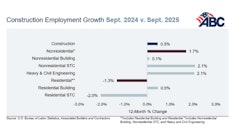
When it comes to the labor shortage plaguing the construction industry, the consensus remains that there aren't enough young workers stepping up to replace those who are retiring. Given the fact that only 16.7% of Gen Z-ers are interested in pursuing a career in construction, this shouldn’t come as a surprise. It's been obvious for quite some time that the skilled trades lack appeal to the tech-savvy younger generation. Although this is a multi-faceted issue that cannot be ignored, perhaps it's time the industry shifted some of its focus to older workers.
According to the U.S. Bureau of Labor Statistics, 4 million Americans quit their jobs in July 2021. This exodus was mostly driven by those 30-45 year olds. It seems that increased pressure and demands in their current positions have caused some to rethink their career choices. Gone are the days when workers landed jobs in their 20s and stayed the course until retirement. While switching jobs once tainted a resume, in recent years it's become much more accepted. In fact, research shows that Americans change jobs on average every four years and that number is slowly decreasing. Technology has compounded the issue forcing many whose positions have become obsolete, outsourced or simply digitally transformed to reinvent themselves. While there are many factors driving the “Great Resignation," not the least of which is better pay, those industries and companies willing to understand and meet the needs of the workforce can emerge as winners. This is especially true among construction companies.
For years, industries like construction have failed to properly position themselves in a drastically changing talent landscape. As attitudes toward the skilled trades shifted, industry response lagged. The benefits of pursuing a career as a craft worker like low tuition, speed to income, good wages (that are increasing due to lack of talented supply) have long been ignored by many in favor of the status and income associated with a four-year college degree. However, perception doesn’t always equal reality, and people are beginning to realize that a degree doesn’t necessarily guarantee a golden ticket to the promised land. Often the work itself lacks fulfillment for those with a different calling.
According to Simon Sinek, “True joy and true fulfillment in our work is the feeling that our work is contributing to something bigger than ourselves.” Another widely overlooked intrinsic value of learning a skilled trade is that it taps into the human need to create.
In many jobs, it’s not easy to achieve the gratification that comes from building a new home, working with wood to craft beautiful furniture, erecting a bridge used by millions of daily commuters, creating a protective flood wall to shelter a community, among many other things. Thankfully, there’s been more movement towards highlighting the merits of careers in construction from social media influencers to dirt podcasts and initiatives like women in construction.
With so many workers contemplating new jobs, now may be the perfect opportunity for the skilled trades to invest in effective recruitment marketing and shine a light on what makes theirs an appealing path to pursue, not just for the younger generation but also for a broader segment of the population searching for flexibility, stability, good wages, and an opportunity to create more in their daily work.



















